We've already dug into unearthing blog niche ideas and sizing up the competition and potential for affiliate websites. Now, it's time to plunge deep into the world of affiliate marketing keyword research. This step is absolutely crucial for your affiliate marketing success. Many folks stumble because they jump into content creation too soon, completely missing what their potential readers and customers actually need.
The common approach—just hunting for low-competition keywords, churning out a blog post, and then stuffing it with as many affiliate links as possible—often leads to plenty of traffic but barely any clicks, conversions, or earnings. We're going to tackle this differently!
The solution is simple: Find keywords you can actually rank for, revolving around topics where product recommendations feel natural and helpful.
In this post, I’ll walk you comprehensively through why keyword research matters so much, show you the steps to pinpoint relevant keywords, analyze search engine metrics, and create high-quality content that benefits both your affiliate brand and your customers. Just like in our other niche site tutorials, we’ll stick with my lever espresso machine example to bring all the theory to life.
By the end of this article, you'll have everything you need for successful affiliate marketing keyword research for your niche site. Let’s make some magic happen!
At its core, keyword research is all about understanding the words and phrases people type into search engines like Google, Bing, or Yahoo when they're looking for information or products. These keywords carry a specific search intent—the outcome the user wants to achieve. As an affiliate, your goal is to earn commissions by strategically placing relevant affiliate links. Keyword research helps you pinpoint the right terms for your blog, videos, or social media posts to optimize your content and boost traffic.
Effective affiliate marketing keyword research answers critical questions: Does the keyword fit your business and niche? What's the monthly search volume and how fierce is the competition? Will the keyword generate stable traffic over time? And what's the ideal keyword density for your affiliate content? By nailing down these answers, you can craft a strategy that specifically draws potential customers to your products.
Keywords are the language search engine algorithms understand. By weaving relevant keywords into your affiliate content, you help the algorithm realize your website is relevant to a user's search query and should rank higher. This process of maximizing user traffic is what we call Search Engine Optimization (SEO).
In online marketing, search engine rankings can make or break your sales figures. The higher your affiliate site ranks, the more likely your link is to appear on the first page of Google's search results. While high-volume keywords might generate more clicks, they're also significantly more competitive. This intense competition leads to a higher Keyword Difficulty, which can limit your chances of visibility.
For affiliate marketing keyword research, it's crucial to understand that broad, popular keywords aren't always the right fit. The choice of terms you target depends heavily on your goals as an affiliate, your specific niche, and the current market saturation. Precise and strategic keyword research ensures you deliver content that genuinely resonates with your target audience, thereby boosting traffic, engagement, and conversions.
Affiliate marketing keyword research goes far beyond just unearthing terms with high search volume and low competition. The crucial factor is Search Intent—the underlying goal a user has when they type something into a search engine. Why did they perform that search? If your content doesn't answer what the customer truly wants to know or do, even the best keyword is useless.
Search engine algorithms constantly try to figure out this intent and deliver the most relevant results. For example, if you search for "Jaguar," you'll likely see results for the car brand, not pages about the animal. Since content that best matches user intent ranks higher, it's vital to understand how to tailor your content to the expected search query.
There are four fundamental types of Search Intent that are relevant for your affiliate marketing keyword research strategy.
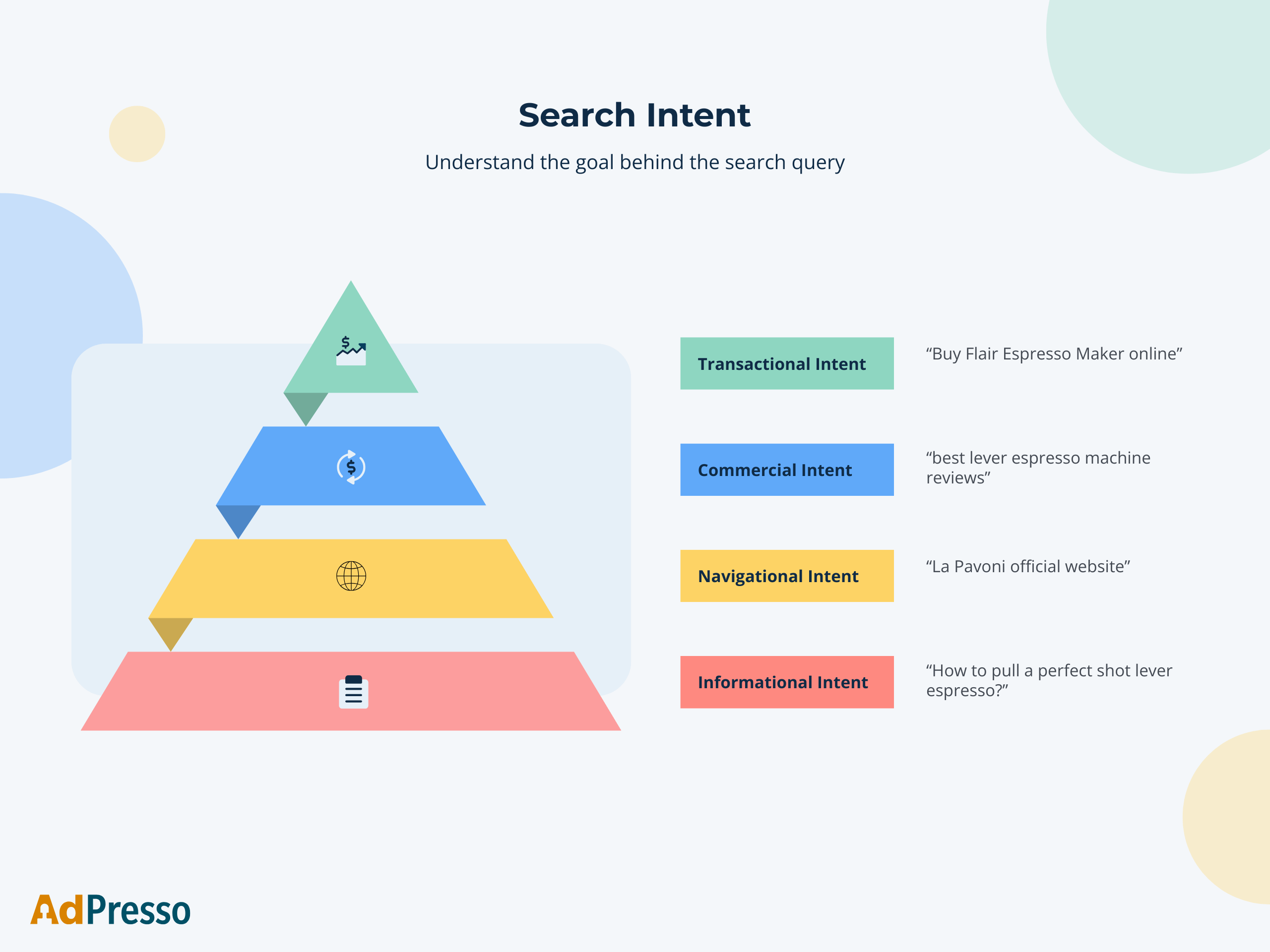
Here, users are hunting for answers to specific questions, definitions, facts, or how-to guides. They want to broaden their knowledge and aren't immediately looking to buy. For affiliates, these keywords are golden for building trust and authority in a niche. By dishing out valuable, informative content, you'll boost traffic and brand awareness. Plus, this can snag you some sweet backlinks, which supercharges your SEO authority.
Examples of affiliate marketing keywords with informational search intent:
These users are already in the market for a product or service and are actively comparing their options. They're typically searching for "best of" lists, brand comparisons, or in-depth reviews to make a well-informed purchasing decision. For affiliates, these are incredibly valuable keywords because they scream "high buying intent!" Your job here is to deliver objective answers and subtly highlight the strengths of your affiliate products without bad-mouthing the competition.
Examples of affiliate marketing keywords with commercial search intent:
After all that research, these users are ready to pull the trigger and buy. They're looking for specific products, prices, discounts, or sales events to quickly seal the deal. For affiliates, this is your moment to drop in those clear Call-to-Action (CTA) statements.
Your goal is to guide the customer directly to the checkout, precisely pointing them to your offers.
Examples of affiliate marketing keywords with transactional search intent:
Users here already have a specific destination or website in mind and are simply using the search engine as a shortcut to get there directly. If your brand is already a household name, it's crucial to make sure your site pops up right at the top for direct brand searches. For most affiliates without major brand recognition, these keywords play a smaller role, unless it's about navigating to a specific affiliate program or a product on a well-known platform.
Examples of affiliate marketing keywords with navigational search intent:
Alright, we've talked about different keyword types, understanding user search intent, and pinpointing niche markets. Now, let's dive into the practical tools that will help you unearth those golden keywords and fine-tune your search.
Affiliate marketing keyword research tools analyze crucial metrics like search volume, competition, and keyword type to help you pick the most profitable keywords.
Below, I'll introduce some key tools for your affiliate marketing keyword research and shine a light on their role in your overall affiliate strategy.
The Google Keyword Planner is a free tool that offers insights into keyword frequency and difficulty, and it even suggests new keyword ideas. All you need is a Google Ads account (no active campaign required), and you can access the "Keyword Planner" under "Tools" to discover keyword ideas or analyze search volume and forecasts. This tool is a decent option for getting a first glimpse into a keyword field. Unfortunately, the data can be pretty rough and doesn't offer a ton of actionable information. Better than nothing, sure, but don't expect it to be a game-changer.

Ubersuggest, a tool by SEO expert Neil Patel, provides fundamental data like keyword suggestions, search volume, and competitor analysis. It's more affordably priced than SEMrush or Ahrefs, generally playing in the same league as Mangools.
However, Ubersuggest, in its entirety, isn't quite as compelling as Mangools. Its main strengths lie in keyword research and competitor analysis. For getting started, I recommend creating a free account to use its limited functions for your affiliate marketing keyword research. It offers a good starting point without any upfront investment.
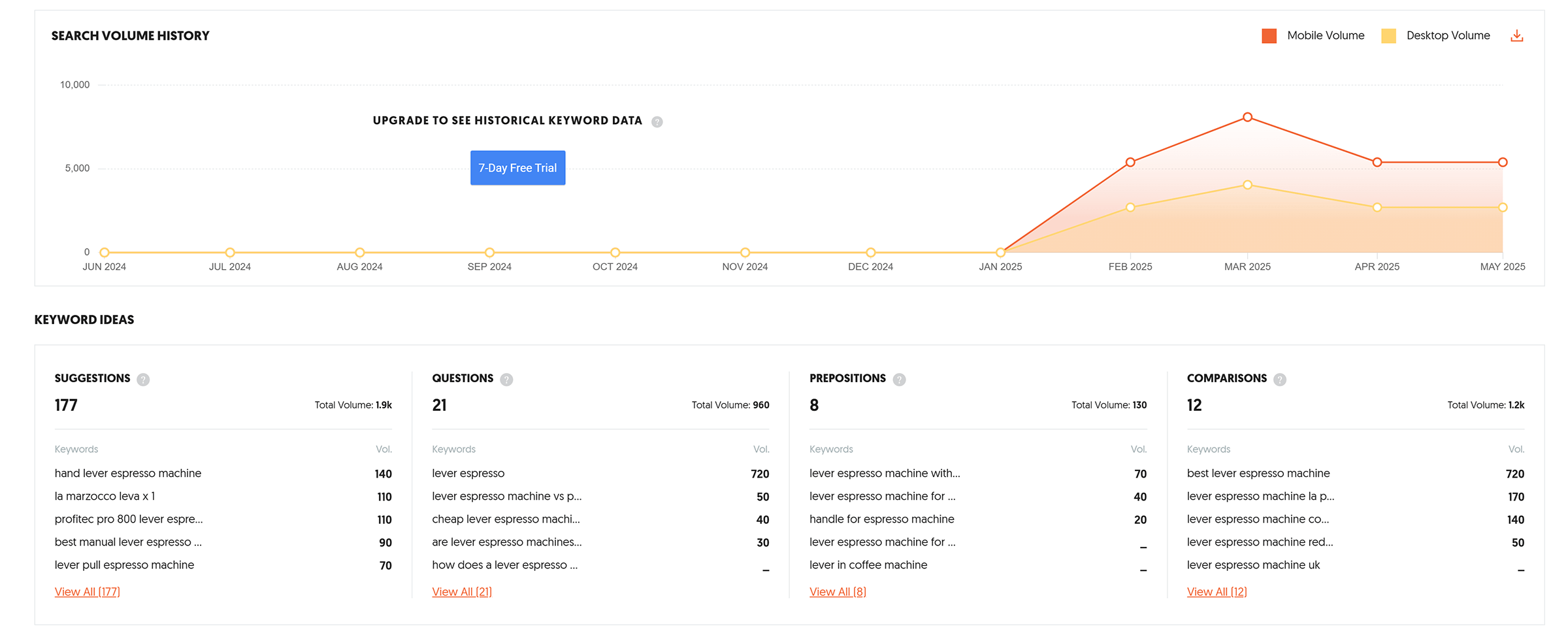
For anyone looking to dive deep into the world of affiliate marketing keyword research, backlink analysis, and SEO rank tracking, Mangools offers outstanding bang for your buck. Their KWFinder is truly considered one of the best tools for keyword research, serving up precise data on search volume and Keyword Difficulty. Unlike industry giants like SEMrush and Ahrefs, which often cost three or four times as much, Mangools is significantly more budget-friendly. This makes professional SEO tools accessible even for smaller wallets.
Mangools isn't just one tool; it's a sleek suite of five intuitive instruments: KWFinder (for comprehensive keyword research, of course!), SERPChecker (for detailed SERP analysis), SERPWatcher (to keep an eye on your keyword rankings), LinkMiner (an efficient backlink checker), and SiteProfiler (for metrics and insights into other websites). This powerful combo makes Mangools an ideal pick for both beginners and seasoned SEOs who crave robust features without having to spend a fortune.
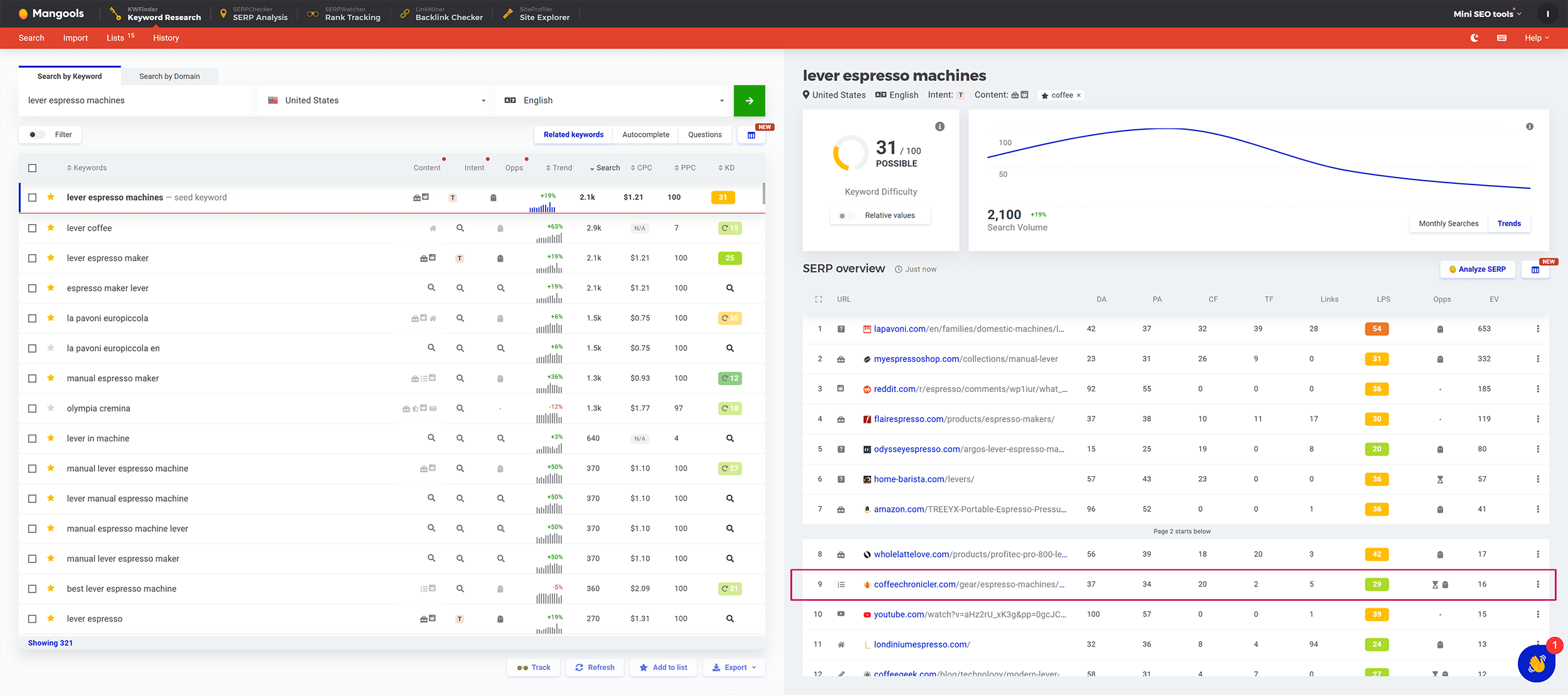
SEMrush is a robust, paid SEO suite, and its "Keyword Magic Tool" is fantastic for unearthing those long-tail keywords that often have less competition. It also sprinkles in detailed metrics like search volume and Keyword Difficulty.
With prices starting around $140 per month, SEMrush is a pretty hefty investment. It really shines for professional affiliates who are playing at a higher level. For beginners just getting their feet wet, it’s a smart move to create a free account. That way, you can tinker with its limited functions – perhaps monitoring a small batch of keywords – before even thinking about committing to a full license.
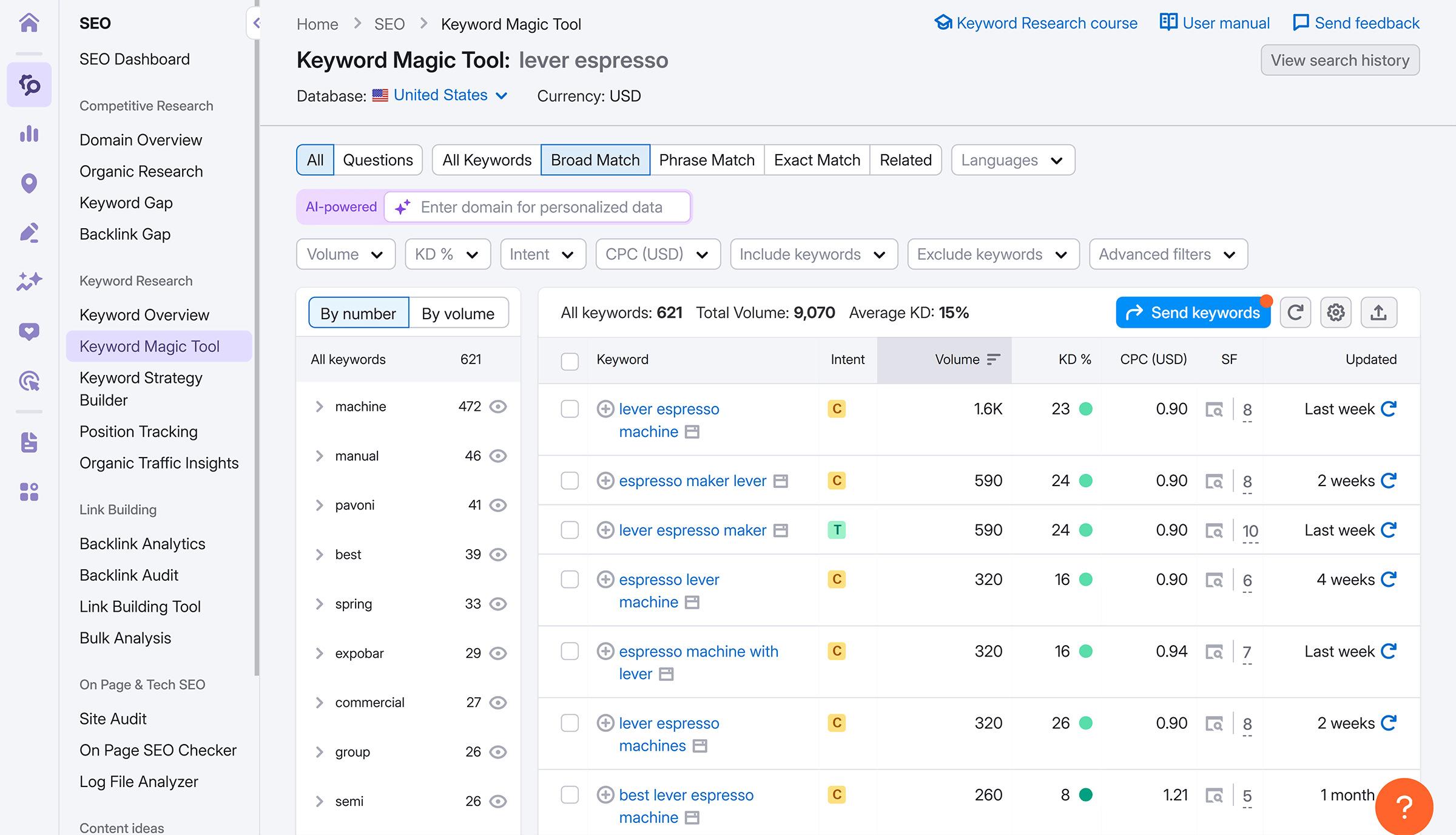
Sistrix is another heavy-hitting professional SEO suite, famous for its deep-dive analytics and its "Visibility Index," which is particularly strong for competitor analysis. Much like SEMrush or Ahrefs, Sistrix falls into the higher price bracket. While it does offer some initial keyword ideas without even needing an account, its comprehensive data is generally too pricey for affiliate marketers operating on a limited budget, making it less recommended for most newcomers.

Ahrefs, similar to SEMrush, is a premium SEO suite that also comes with a significant price tag. It's built for detail-oriented SEO professionals who are ready to invest in a top-tier solution. For beginners just stepping into affiliate marketing, this powerful tool will generally be too expensive.
The Ahrefs toolkit specializes in comprehensive affiliate marketing keyword research, backlink analysis, and all-around SEO insights. Their Ahrefs Keyword Explorer provides precise traffic volumes from ten major search engines and lets you generate super-detailed keyword ideas using specific filters, including phrase match, autocomplete suggestions, and question-based keywords.
While you can grab a free account to regularly monitor your own sites for SEO errors, keep in mind that the advanced keyword research tools aren't included in that free tier.
In affiliate marketing, profitable keywords generally fall into two categories: those you can use directly to promote your products, and those that relate to topics your target audience is already actively searching for.
Your research will help you figure out which topics will bring the most benefit to your brand and how specific keywords best align with your message. Should you compare products and brands, write detailed reviews, or focus on building authority with informative, non-commercial content?
Below, we'll dive into four fundamental types of affiliate marketing keywords you should consider for your targeted keyword research when crafting your affiliate content.
Keywords in this category are used when people are searching for the best product within a specific niche. They're often looking for "top lists," pros and cons, or a general overview.
Examples of general comparisons:
This type of keyword offers an excellent opportunity to prominently feature your affiliate products and help potential buyers make their decision. However, it's important to note that these general comparison topics often come with higher search volumes and, consequently, tougher competition in terms of Keyword Difficulty.
Branded comparisons focus on specific products or manufacturers. Searchers use these keywords to pit individual product lines or offerings from competing companies against each other.
Examples of braided comparisons:
These comparisons often have a lower search volume than general product comparisons. However, the typically lower keyword competition offers a better chance to gain a foothold in search rankings. Even though low-competition keywords might generate less overall traffic, they are incredibly valuable because the customer searching for such comparisons is usually just a hair's breadth away from making a purchase decision.
The easiest way to unearth these kinds of keywords is by plugging a list of relevant brands plus something like "vs" into your affiliate marketing keyword research tool.
For instance, if you type in brands for lever espresso machines like "Flair Espresso," "La Pavoni," or "Cafelat Robot," you'll get a bunch of relevant comparison keywords. If you can't think of any brands off the top of your head, just browse the categories and brand names on popular online shops for coffee gear or espresso machines. Often, they'll have a "Shop by Brand" section that's a treasure trove of potential brands for comparisons.
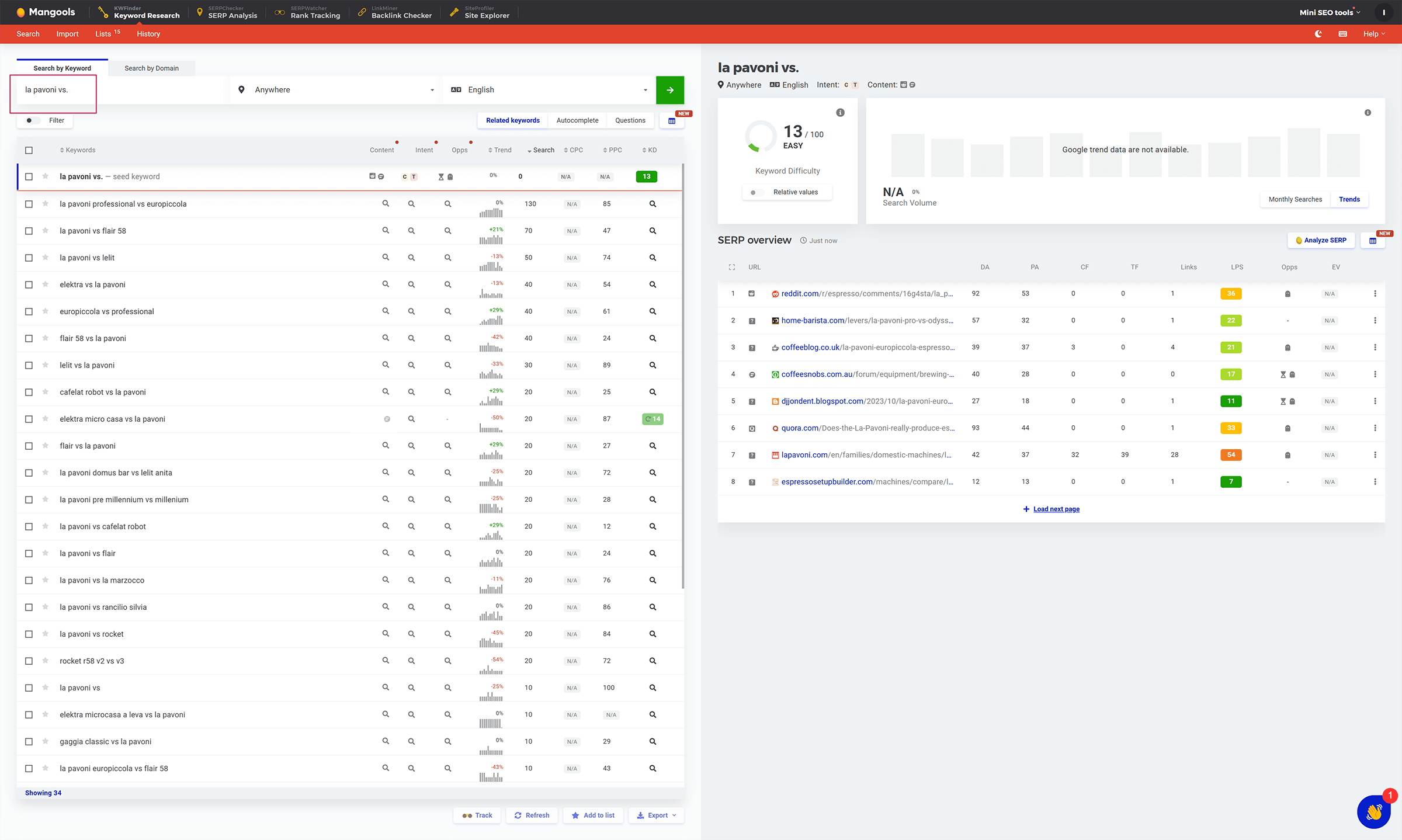
A prime example of a low-competition, high-value keyword could be "la pavoni vs flair 58." Both of these machines are in a higher price bracket, and the searcher has already narrowed down their choices significantly. When you check the Search Engine Results Page (SERP) for this, you'll likely notice that many of the top-ranking pages often come from websites with low Domain Authority (DR) and just a handful of referring domains. This is a clear signal that this specific niche is relatively easy to conquer!
Heads-up: If a company manufactures different product types (say, espresso machines and grinders), it might make more sense to use specific model names like "La Pavoni Europiccola" and "La Pavoni Professional" as your seed keywords, rather than just the brand name itself.
Product reviews zoom in on a single product. Users who are ready to buy often search for those last-minute details that could sway their decision. They've likely already spotted an affiliate product and are now specifically hunting for an independent assessment.
This type of keyword is brilliant for affiliate marketing because users are incredibly close to making a purchase – they're highly invested in the product. However, it's worth noting that the search volume for individual product reviews is often lower than for other keyword types.
Examples of product reviews:
The simplest way to discover these keywords is to plug some brand names into your affiliate marketing keyword research tool. Then, simply use the filter option to find keywords that include the term "review."
After that, all you need to do is evaluate the ranking difficulty and pick the products for which you believe you can actually rank. It's crucial to only review products that people are genuinely searching for, even if the search volume isn't massive.
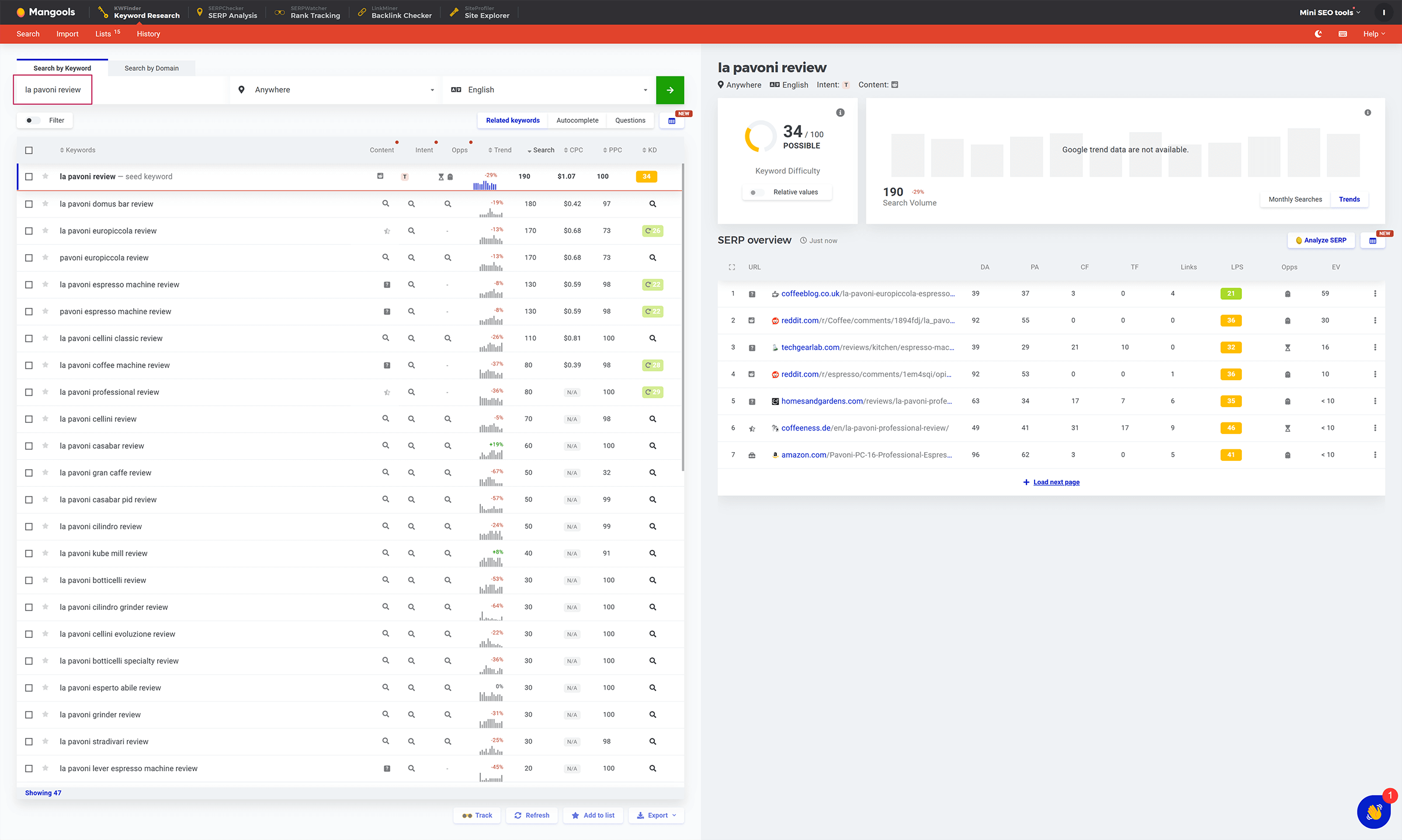
To rank high in search engines, your affiliate site needs to radiate authority and trust. And you don't build that trust solely with commercial keywords. Instead, you do it by informing and educating your visitors.
Trust & Authority keywords (T&A keywords) focus on non-commercial topics. When you create content that imparts knowledge and answers questions, you establish yourself as an expert in your niche. Even without direct product promotion, you're demonstrating expertise, which makes potential customers more likely to trust the quality of your product recommendations.
There are a few ways to hunt down those elusive T&A keywords.
People often flock to Q&A platforms looking for solutions to their problems. These are absolute goldmines for long-tail keywords and help you discover specific user questions and desires within your niche. Don't forget to look internationally too, to gain broader insights!
Recommended platforms for this include:
Furthermore, becoming a member of relevant Facebook groups can be incredibly useful for stumbling upon new questions and then creating fitting content.
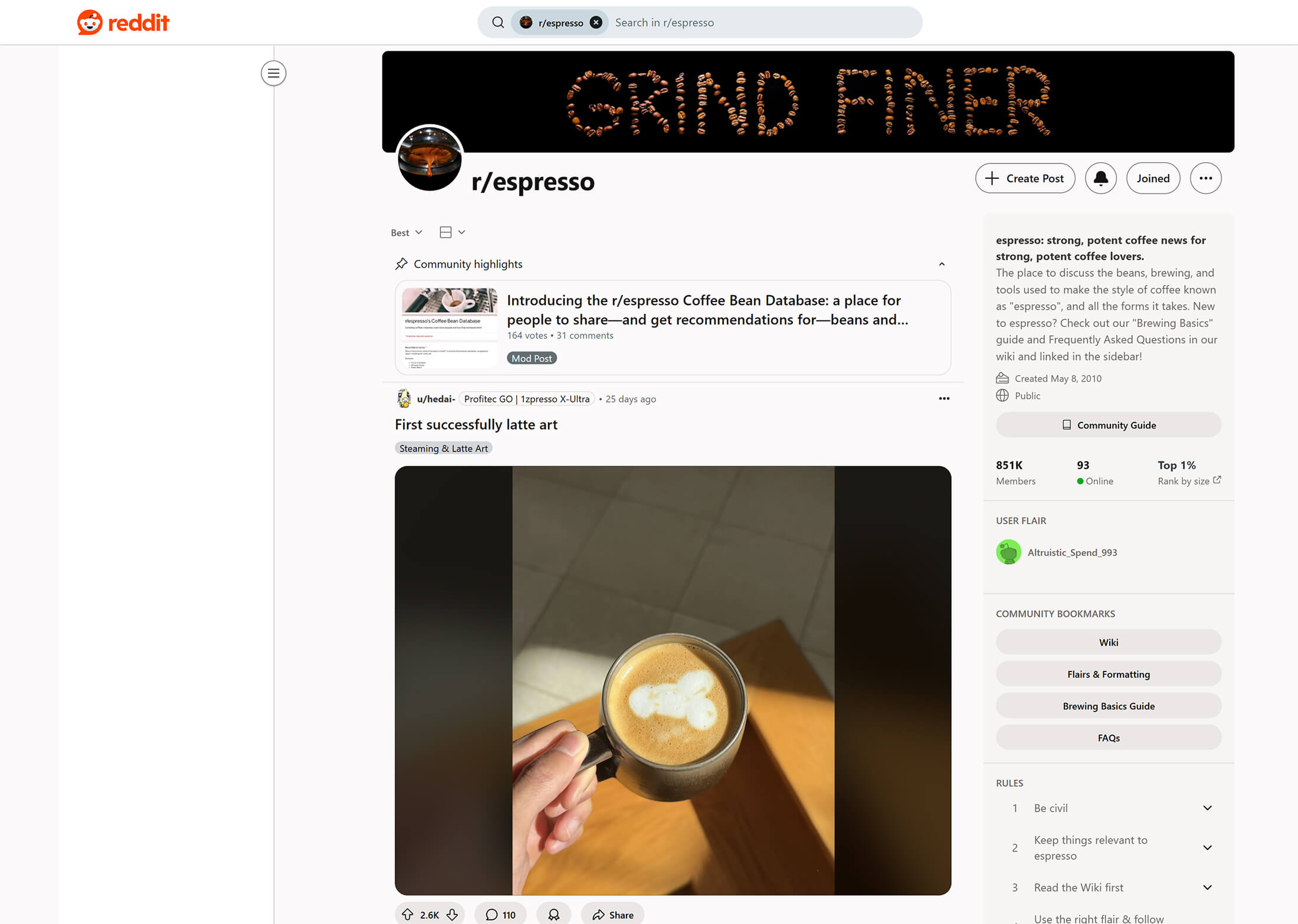
Examples of long-tail keywords from Q&A platforms and social media:
Alright, let's get started by punching some foundational terms related to your topic into your affiliate marketing keyword research tool. For our lever espresso machine example, this could be "espresso," "manual coffee," or "home barista." Now, filter those results by Keyword Difficulty (let’s say, above 35).
This particular value gives you a hint about how many websites are linking to the top 10 ranking pages, making it a solid indicator for topics that can attract a lot of juicy links. Next, it’s time to check for relevance and backlinks: Finally, assess whether the topics you've found are genuinely useful for your target audience. Dig into the Search Engine Results Page (SERP) and the backlink profiles of the top-ranking pages to pinpoint topics that already pull in high-quality backlinks.
Even if visitors to these pages aren't whipping out their wallets to buy immediately, T&A (Trust & Authority) keywords are absolutely excellent for building brand awareness. Plus, you can cleverly use the "Middleman Method" by setting up internal links from your authoritative T&A pages to your "money pages" (your product or comparison pages) to give their rankings a solid boost.
The general principle here is pure gold: Search engine auto-completions offer a direct peek into what users are actively searching for. Your mission? Collect these suggestions from various search engines and e-commerce platforms, then clean up that list by ditching any duplicates.
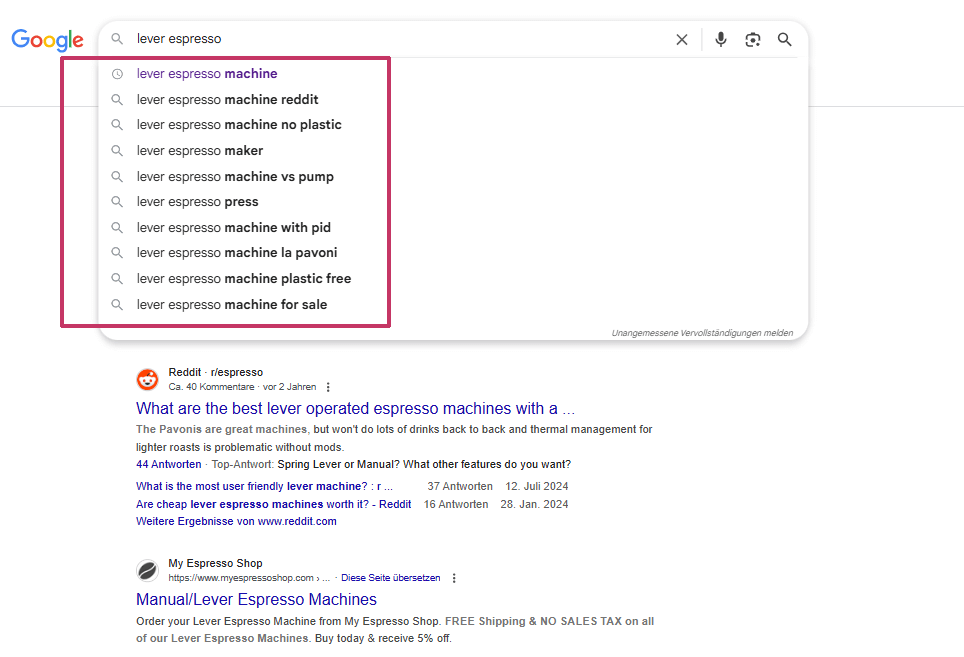
You can start by manually checking this out yourself. Just pop your keyword, or even just a part of it, into Google's search bar and watch the auto-suggest magic unfold. You're bound to stumble upon some fantastic keyword combinations to add to your list.
And guess what? There are also tools out there designed to give you a helping hand in analyzing all that juicy Auto-Suggest data.
Keywordtool.io is a handy little helper for directly extracting AutoSuggest keywords from the suggestions of various search engines and platforms. The best part? You can snag these keywords for free, no account needed! This is especially valuable if your affiliate marketing keyword research strategy goes beyond just Google, as you can choose between AutoSuggest data from Google, Amazon, eBay, Instagram, Play Store, Pinterest, Etsy, TikTok, and even Google Trends. Talk about a smorgasbord of ideas!
However, here's the catch: the free version sadly doesn't cough up any search volumes or other performance data – those are strictly reserved for a Pro account. So, while KeywordTool.io is excellent for collecting a broad range of keyword ideas from diverse sources, you'll need to open your wallet for deeper analysis.
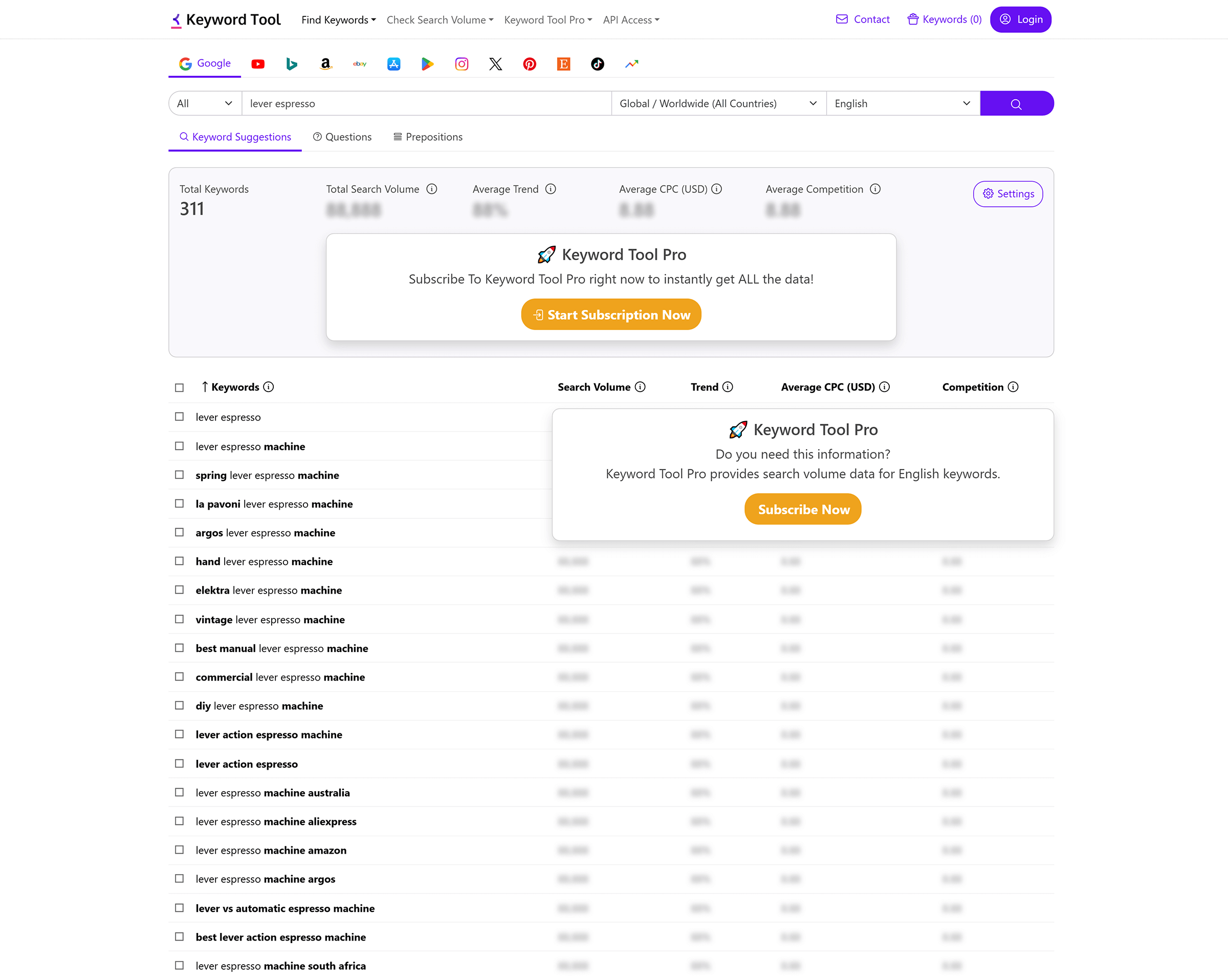
Our old friend, KWFinder from the Mangools suite, also comes equipped with an option to pull up Auto Complete data. Instead of hitting the "related-keyword" or "questions" tab, you simply select the Autocomplete tab. Handily, the results appear right alongside all those familiar Mangools metrics, letting you instantly gauge the potential of each keyword. Now that's what I call efficient affiliate marketing keyword research!
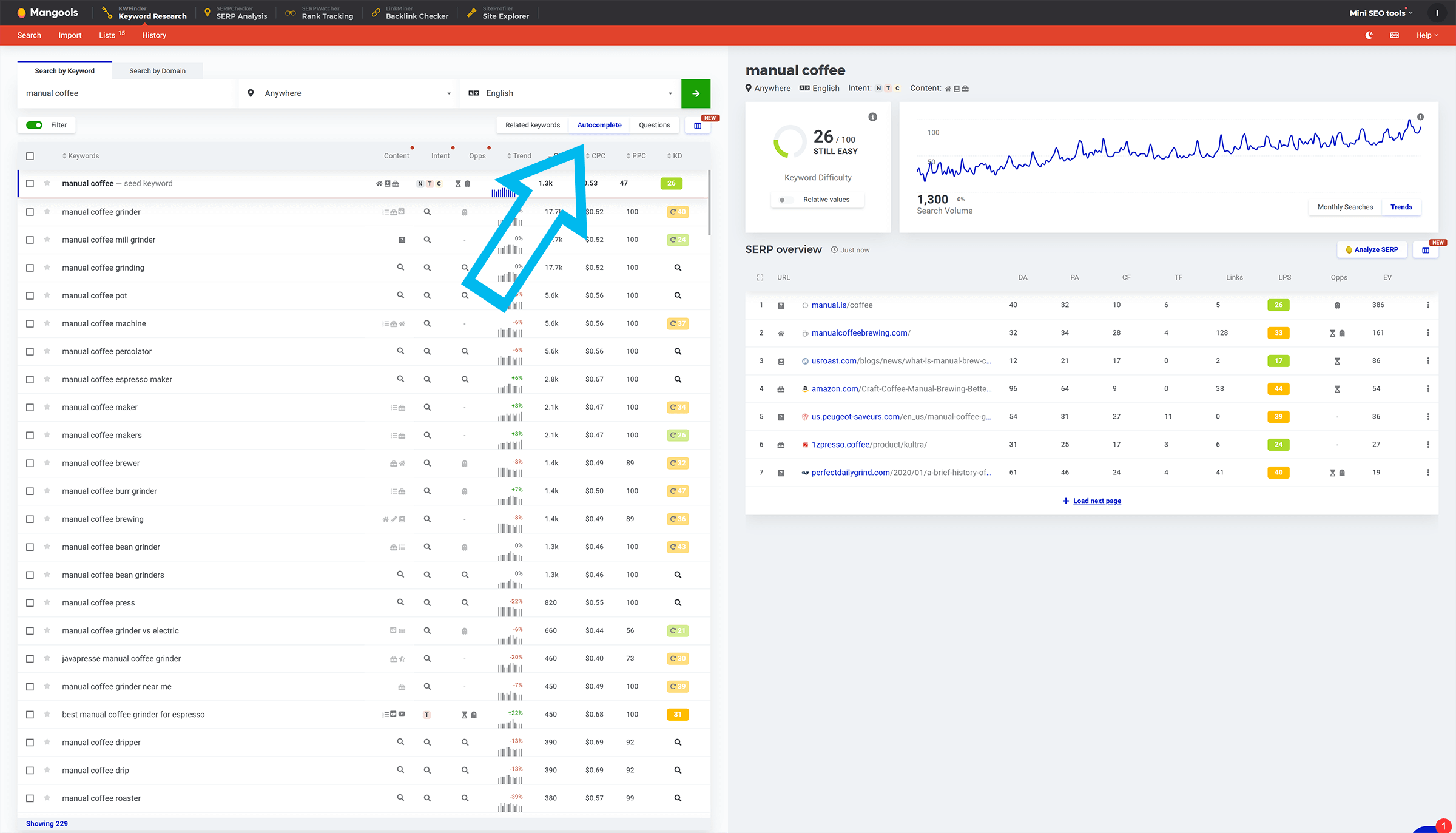
Alright, we've tackled the basics of affiliate marketing keyword research, but now it's time to plunge even deeper into user intent. Your potential readers and customers aren't just typing keywords into the search bar; they're asking questions, hunting for solutions, or aiming to achieve something specific. Grasping this underlying intent is the golden key to crafting content that doesn't just get found, but truly resonates and offers genuine value.
Questions (who, what, when, where, why, how) are a powerful secret weapon for decrypting these direct user queries. They precisely reveal what searchers are really looking for. By harnessing these questions, I can develop content that directly addresses those needs, skyrocketing the chances that my insights will be perceived as the best answer by both Google and, more importantly, by the users themselves.
In this section, I'll introduce you to some seriously effective tools that will help you pinpoint these questions and unlock the user intent hiding behind them.
AnswerThePublic, another neat tool from Neil Patel, is fantastic for unearthing direct user questions and queries around a specific keyword. Its standout feature is its unique visual display of results, which I personally find incredibly inspiring.
While the number of daily free searches is now limited to just three per day, AnswerThePublic remains super useful even in its free version. Besides grabbing ideas from Google's "People Also Asked" sections, you'll get keywords sorted by prepositions, comparisons, alphabetically, or by numbers, plus a bunch of related terms. And you can even export all the results as a table. This tool is a valuable addition for understanding user intent and sparking fresh content ideas.
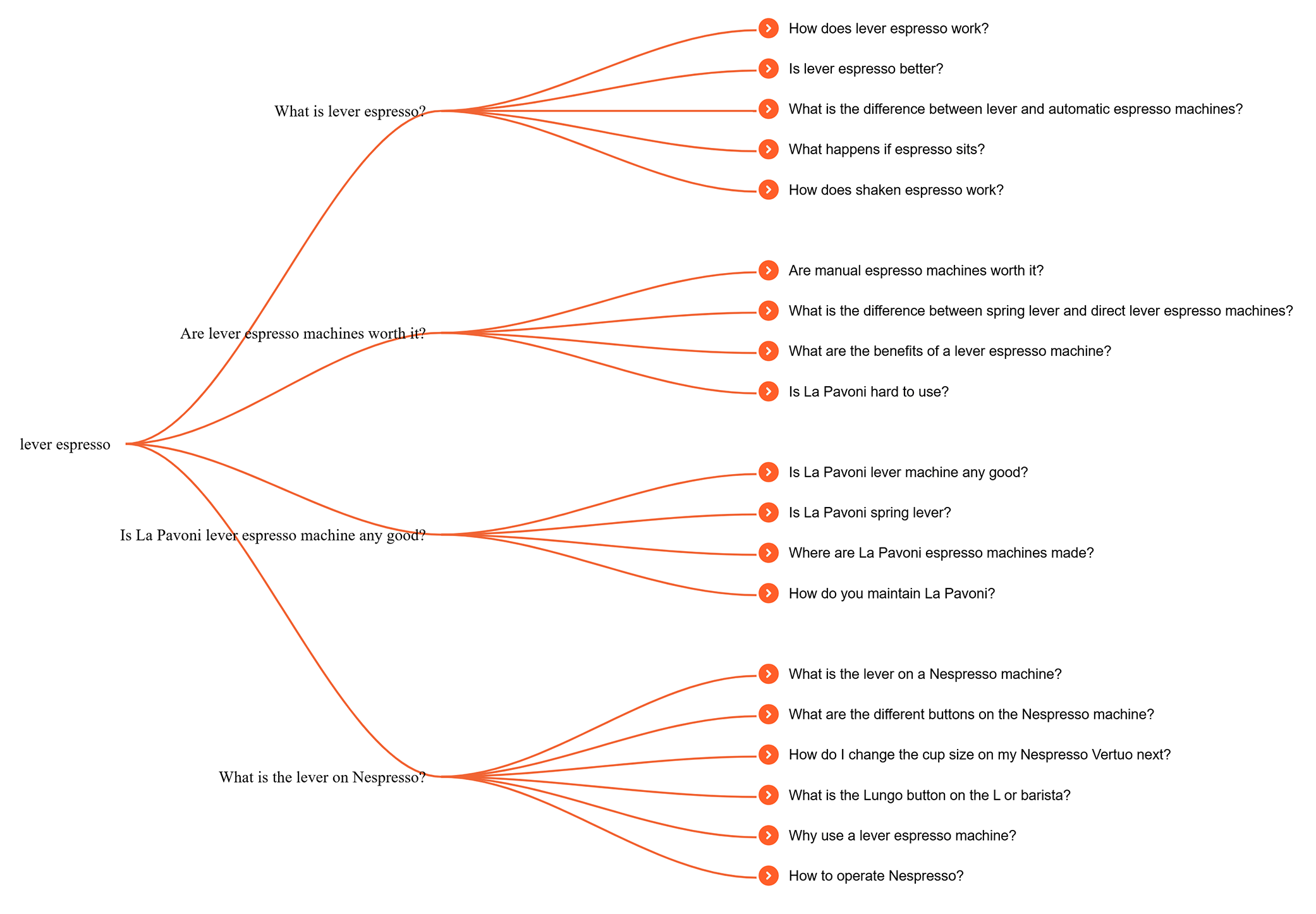
QuestionDB is an excellent tool for discovering questions that users are typing into search engines. It’s ideal for digging up content ideas that are proven to be popular and have high ranking potential – whether it's for nabbing a Featured Snippet or for crafting more comprehensive articles.
This tool generates a list of relevant questions from any keyword you throw at it. These can serve as a direct springboard for blog posts, YouTube videos, or FAQ pages. With a free account, you’re limited to five searches per month. The results are flexibly displayed as cards, a table, or even visually as a tree, offering extra inspiration for your content strategy.
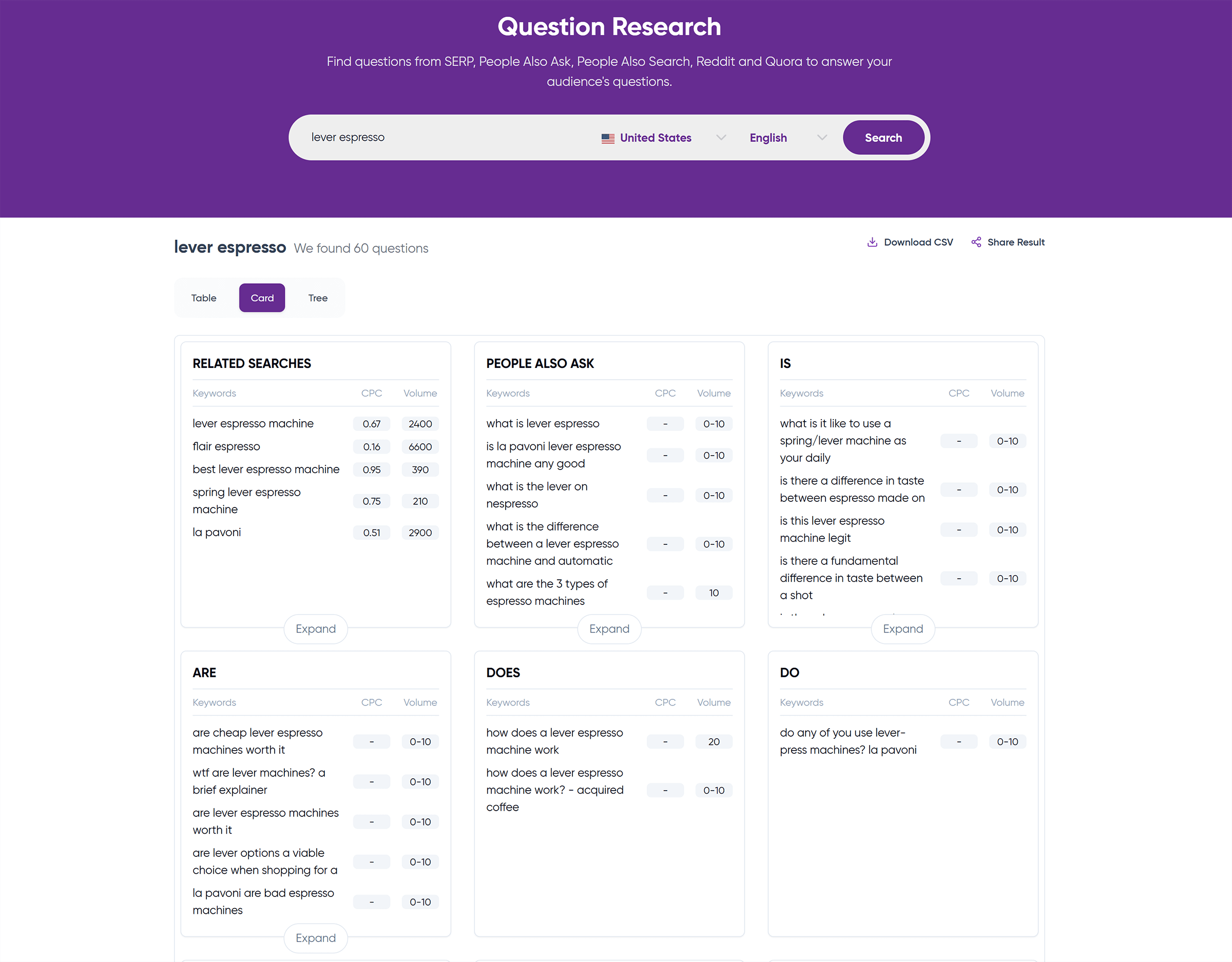
Mangools, with its already familiar KWFinder, offers not just the ",renablingated towords" tabmultipleso a dedicated "questions" tab. This tab serves up specific questions that you can answer with perfectly tailored content. It's incredibly handy for identifying those burning questions and then checking their search volumes and even peeking at the competition's ranking content.
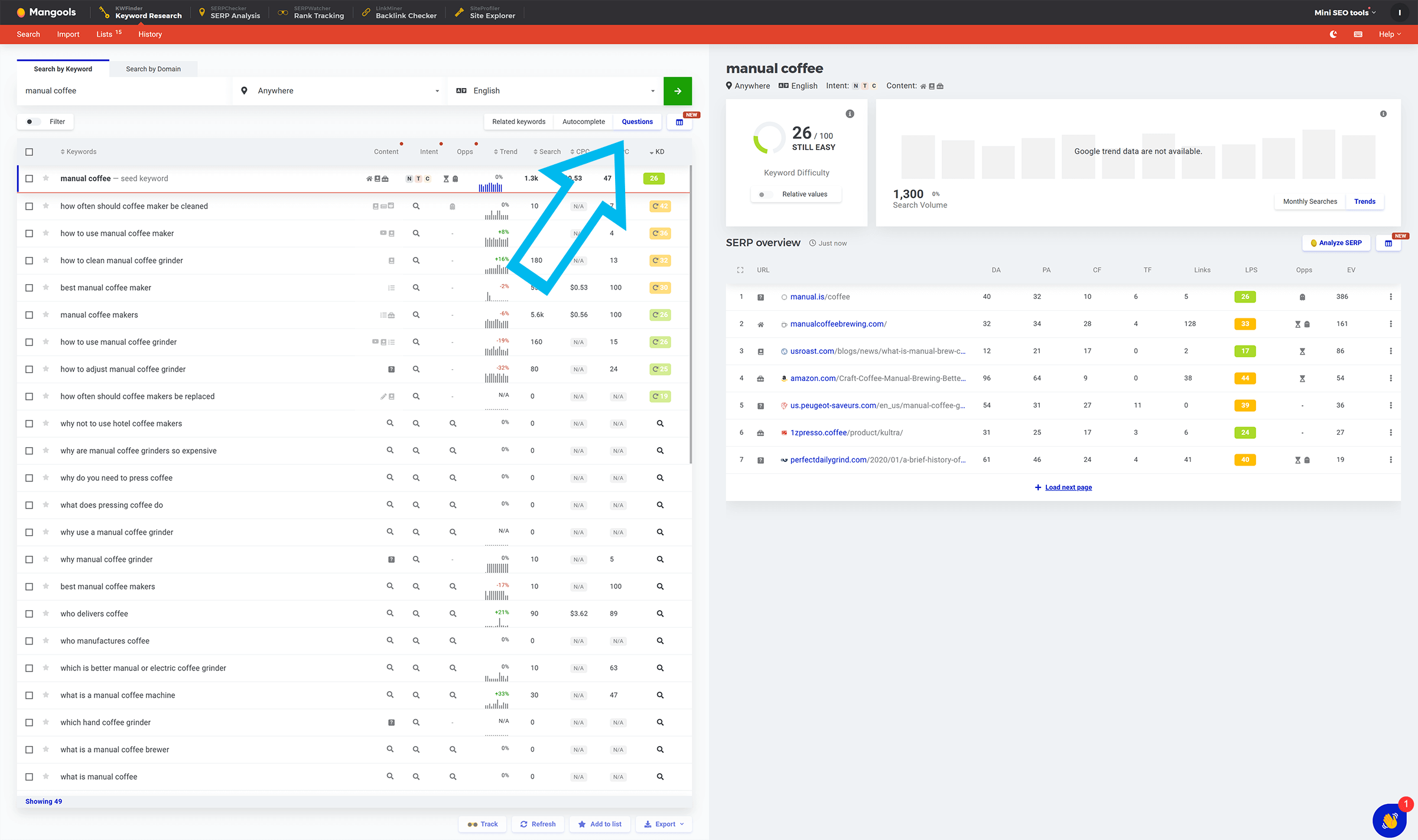
By leveraging the tools mentioned, you can pinpoint specific questions that clearly reveal user intent, and then craft highly targeted content to answer those questions. The outcome of my affiliate marketing keyword research for questions and their associated search intents might look something like this:
To truly supercharge your keyword list and dig up those specific, often long-tail gems, you'll want to systematically combine your core keywords with common modifiers. And here’s a quick tip for instant ideas: always check out the "Related Searches" section right there on Google's results pages!
Typical modifiers that can spark some magic include: "year" (e.g., "2025"), "similar to," "alternative to," "experiences," "review" (as in "user review"), "cheap," "buying guide," "critique," "opinions," "disadvantages," "negatives," "buy online," "quality," and "comparison."
For this specific task, there are specialized—and mostly free—tools like Keyword Mixer. You can fill multiple fields with different keywords, and the tool will churn out every possible combination.
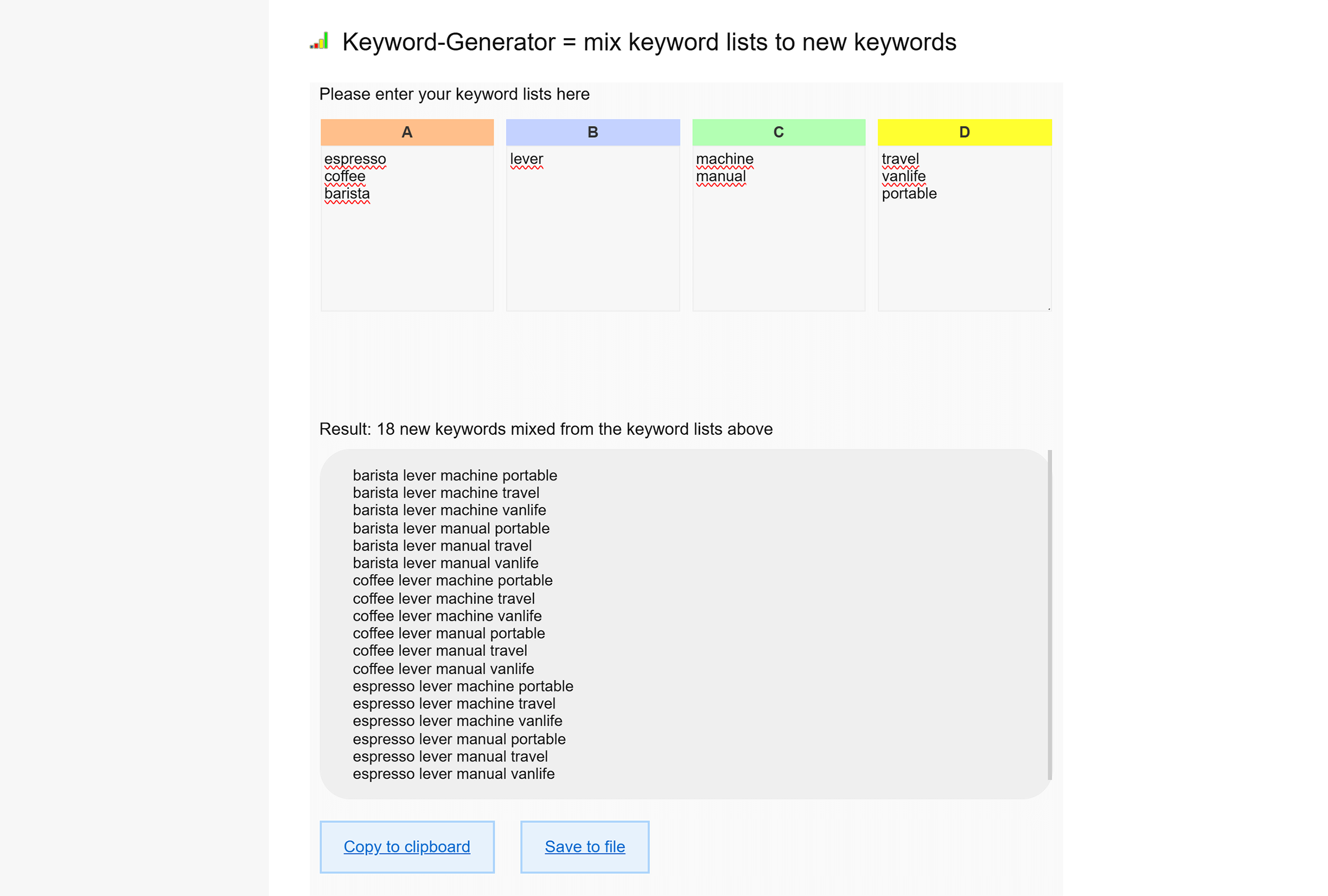
While this method can be super helpful for covering the last 20% of your affiliate marketing keyword research, initially, focus on those other, more fundamental methods to build a rock-solid foundation. The detailed work with keyword combinations can follow once your main strategy is locked in.
The general principle here is pretty straightforward: E-commerce websites and price comparison portals often categorize products by features, types, and attributes. Every single filter or category you see can be a valuable keyword or a brilliant content opportunity waiting to happen! For this particular job, there aren't really any dedicated tools. Instead, you'll need to manually click through the subcategories of international e-commerce sites like Amazon or eBay. Price comparison portals like PriceRunner.com or even Google Shopping can also be incredibly helpful.
Here's the result of a quick affiliate marketing keyword research dive on Amazon.com for "Espresso Machines." Those selectable specifications and features are absolutely brimming with new potential keywords!
You see, this is a prime example of how Browse major e-commerce platforms can really kickstart your keyword game. Every single filter, every selectable attribute, is essentially a user's specific need or preference expressed in keyword form.
Here’s what I found, offering a treasure trove of new keyword ideas:
| Category / Feature | Subcategory / Value (Examples) |
|---|---|
| Popular Ideas | Office, Milk Frother, Portable, Retro, Capsule, Manual, Filter |
| Brands | CASABREWS, Breville, Gevi, Ninja, De'Longhi |
| Features | Milk Frother, Portable, Programmable, App-Controlled, Auto Shut-Off |
| Material | Stainless Steel, Plastic, Aluminum, Glass, Metal, Silicone |
| Capacity | Up to 4 Cups, 5 to 8 Cups, 12 Cups & Above |
| Style | Casual, Classic, Modern, Retro |
| Dimensions | Height, Depth, Width (specific inch ranges) |
| Filter Type | Paper, Reusable |
See how that works? You can take a brand like "Breville" and combine it with a "Feature" like "App-Controlled," or a "Material" like "Stainless Steel." Suddenly, you’ve got specific, long-tail keywords like "Breville App-Controlled Espresso Machine" or "Stainless Steel Manual Espresso Maker"—perfect for targeting users with highly specific needs. This is how you discover those ultra-niche opportunities for your affiliate marketing keyword research!
Group all those juicy keywords you've collected into logical clusters. These clusters will then become the bedrock for your website's navigation and, ultimately, for each piece of content you create. Think about the user journey: how would people find your site, and how would they naturally navigate once they're there?
In a nutshell, you're going to map the results of your affiliate marketing keyword research onto your planned website structure. And listen, this isn't a one-way street! It's a reciprocal process where you should absolutely be open to making tweaks and changes to your website's structure and navigation as your keyword insights deepen.
Typical elements of an affiliate website, besides the homepage, include: Product Reviews, Best-Of Lists, Guides / How-To's, and Category Pages / Hub Pages. Within these formats, you can now start crafting content to cover your target keywords.
Here's the table with concise example content titles, all focused on our beloved lever espresso machines.
| Affiliate website element | Example content titles |
|---|---|
| Homepage | Your Lever Espresso Guide |
| Product Reviews | Flair PRO 2 Review |
| La Pavoni Europiccola: Classic Review | |
| Product Comparisons / Best Lists | Best Manual Espresso Machines 2024 |
| Lever Machines: Big vs. Small | |
| Guides / How-to's | Perfect Espresso Shot: Lever Machine Guide |
| Cleaning Your Lever Espresso Maker | |
| Category / Hub Pages | All Lever Espresso Machines |
| Lever Espresso Accessories | |
| Shop | Buy Lever Espresso Machines |
| Flair Espresso Parts |
I like to build niche sites with a maximum of 5 to 7 navigation items in the menu. After the affiliate marketing keyword research we just did, I'm now looking for those keywords with the most traffic and a realistic Keyword Difficulty. Don't just grab the top 5, though. The structure and navigation of the niche site need to make sense. Always think about your visitor. Whether they land on your homepage or a sub-page, they need to easily find their way around from any point on the site.
Before you start splitting up your keywords, get clear on the goal behind the search query and what content can satisfactorily fulfill that search intent. Make sure to balance the different Search Intents and avoid only producing content for Commercial or Transactional search intent.
Different search intents in my example could look like this:
It's best to create an overview in Excel or Google Sheets to map out your website's structure and then assign the most promising hits from your affiliate marketing keyword research to it. From this table, you can later derive a detailed content plan.

A solid, strategically focused affiliate marketing keyword research is the absolute bedrock for your success. Before you even think about writing the first line of content, this crucial step needs to be buttoned up. It's the only way you'll ensure you're hitting the real needs and precise search intent of your target audience. If you're writing past what your users actually want, you're just not going to get the reach or conversions you need.
I've just walked you through a ton of ways and proven tools to identify relevant keywords, sift out the irrelevant ones, and analyze their search intent, competition, and search volume. With these methods in your arsenal, you've now gathered more than enough keyword ideas to fill your content calendar. But finding the keywords is only half the battle – the next step is figuring out their ranking difficulty so you can pick the best topics for your site.
On your journey, you can make significant headway even without shelling out for expensive pro tools, or by using their limited "lite" versions. Sure, it often demands a bit more manual elbow grease and time, but it's absolutely doable. However, if you're ready to invest, professional tools can cut down an immense amount of work and offer genuine added value. Given the often steep price tag of SEO tools, which can be totally out of reach for beginners, I wholeheartedly recommend the Mangools suite as an excellent compromise – I've been successfully using it for my own projects for years.
The strategies and tools I've shared here give you the power to elevate your affiliate marketing efforts. Use this knowledge and get started now to truly own your online presence and build lasting success!